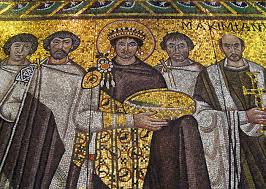byzantine
英 [bɪˈzæn.taɪn]
美 [bɪˈzæn.taɪn]
- adj. 拜占庭式的;东罗马帝国的
- n. 拜占庭人,拜占庭派的建筑师
星级词汇:

记忆方法
将“Byzantine”记忆为“古罗马的救赎”,想象古罗马(Byzantine 源自拜占庭帝国,后者是古罗马帝国东部的延续)经历了一系列复杂和精妙的变革,最终救赎了自己的文明精髓,形成了一个复杂且独特的文化体系。通过这样的故事性联想,可以帮助记忆这个单词的含义。
以上内容由AI生成, 仅供参考和借鉴
中文词源
Byzantine 拜占庭帝国的
来自其创建者的名字Byzas of Megara.
英语词源
- Byzantine (adj.)
- 1770, from Latin Byzantinus (see Byzantium); originally used of art style; later in reference to the complex, devious, and intriguing character of the royal court of Constantinople (1937). As a noun from 1770.
权威例句
- 1. The images were Gothic or Byzantine rather than classical.
- 这些形象属哥特式或者拜占庭式而非古典式。
- 2. an organization of byzantine complexity
- 拜占庭式复杂诡秘死板的机构
- 3. We propose a new protocol for the Byzantine Agreement which is based on agents.
- 本文在研究了国内外Byzantine协议 的基础上提出了一种新的Byzantine一致性 协议,即基于代理的Byzantine一致性协议.
- 4. The Byzantine Empire in theory represented the whole Christian world.
- 从理论上说,拜占庭帝国代表了整个基督教世界.
- 5. There are also several well-preserved Byzantine frescoes.
- 也有几处保存完好的拜占庭时期的壁画。